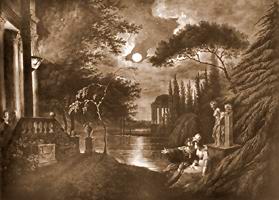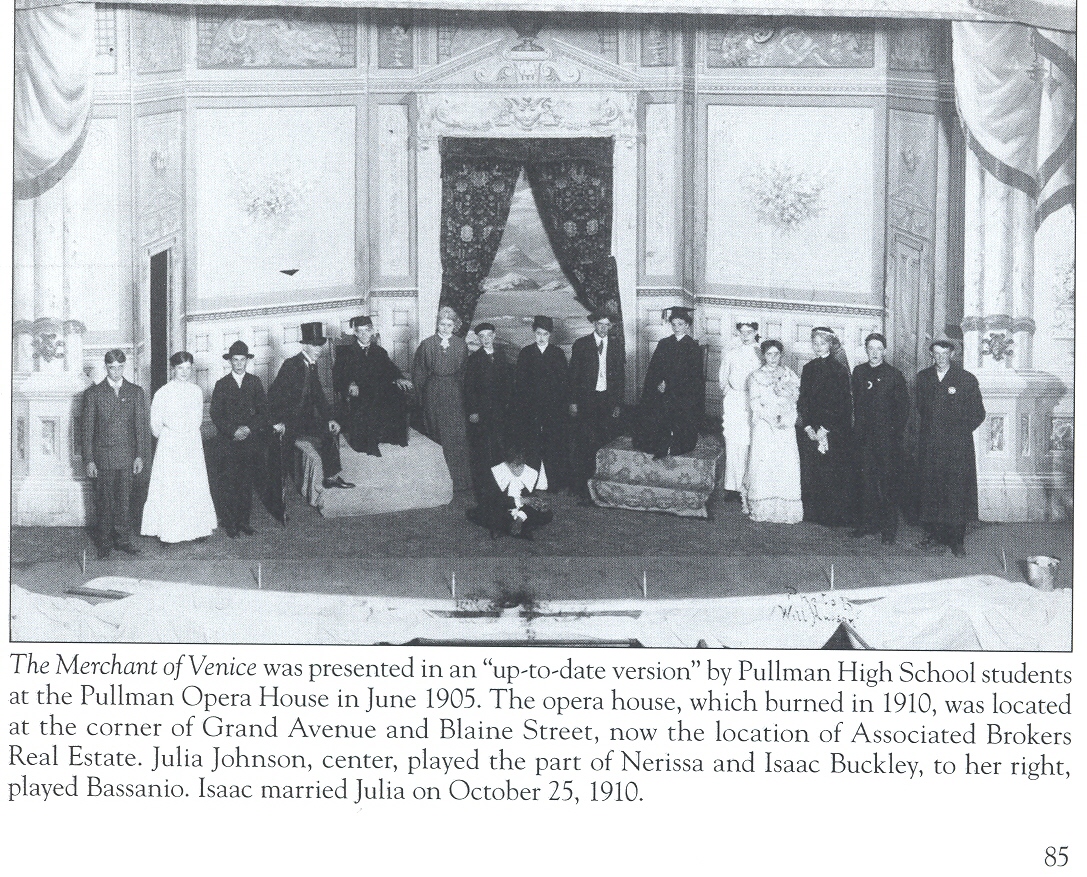Dr. Michael Delahoyde
Washington State University
THE MERCHANT OF VENICE
ACT V
SCENE i
Lorenzo and Jessica blab about moonlight, under which "romantic acts of
love and daring" are alluded to (Carey 171). But Cressida, Thisby, Dido
-- these are not romantic acts, but cataclysms! "Still, it is odd that
Jessica should refer to the tale of a woman who betrayed her father for
her lover and who was regarded not as a heroine by the Greeks but as a
villainess, and who came to so bad an end besides. Might we argue that
Shakespeare's sneaking sympathy for Shylock shows itself here yet again?"
(Asimov 541).
|
"Endymion, in the Greek myths, was a handsome prince who, asleep in a
cave one night, was spied by Selene, goddess of the moon. Ravished by
his beauty, she descended to the cave and kissed the sleeping youth. She
wanted no more and, throwing him into a magic, eternal slumber, she returned
night after night to kiss him and sleep awhile by his side" (Asimov 542).
Lorenzo looks at the night sky and perceives "gold" (V.i.59). Musicians
play and Jessica confesses, "I am never merry when I hear sweet music"
(V.i.69), prompting Lorenzo to speechify about the special powers of
music, which owes something to Count Lewis' discourse in "praise of
Musicke" in Castiglione's The Courtier (Ogburn and Ogburn 67,
246-247).The chat is all very romantic on the surface, but Lorenzo is
talking about music's power to distort nature! I think he's talking
about Muzak here -- easy-listening yuppie music that suggests that
everything is serene. "Mark the music" (V.i.88) -- the standard imperative
mode a la "Shake your booty," "Play that funky music," "Let the music take
control," "Do it 'til you're satisfied," etc., only in this case slow-tempo
lulling music to re-brainwash by. Still, these discussions on music have
frequently been referred to as pointing towards the Earl of Oxford and
his musical expertise (Clark 341).
|

|
Portia and Nerissa return home and remark on the moon outshining a candle
-- perhaps a metaphor for Christianity's superseding Judaism (cp.
V.i.125f -- a vague eclipse metaphor operating similarly). They hear the
music and agree that any godawful noise sounds good so long as nothing
else interferes with it to which we might compare it: "The crow doth sing
as sweetly as the lark / When neither is attended" (V.i.102-103) -- in
other words, obliterate all else and whatever you've got won't be
perceived as horrible! I take this to be a final perspective on the dark
side of this play. "Exclusiveness -- and the hypocrisy exclusiveness always
involves, the pretense that that which is excluded is somehow less real than
/ that which excludes" (Goddard, I 83-84).
Soon the women are accusing Bassanio and Gratiano of giving away their
wedding rings to other women. An extended passage uses the word "ring"
in the rhyming spot at the end of nine out of ten consecutive lines
(V.i.193-202) -- in essence, "ringing" out the word. Oxfordian Ian Haste
has discovered that this is bilingual word-play: a specifically Venetian
word for wedding ring was Vera, whose plural form (explaining perhaps
the superfluous second marriage and ring of Gratiano and Nerissa) was
Vere ["The Name within the Ring: Edward de Vere's 'Musical'
Signature in Merchant of Venice." Shakespeare Matters
8.2 (Spring 2009): 1, 23-26, 28]. And note that the final word of the
play is also "ring," "exactly the place where you and I would sign
our names to something we had written" (Haste 25).
The dubious comedy of this is played out before all is revealed, three
of Antonio's ships have come sailing in -- he echoes Shylock, but saying,
"I am dumb" (V.i.279). "Antonio is the silver casket. He got as much
as he deserved: material success and a suicidal melancholy" (Goddard,
I 92). And Lorenzo and Jessica will inherit. Portia is practically
declared a messiah. It's almost dawn, so instead of going to bed, we had
might as well go explain in detail all the recent plots: "and the play
comes to an elegant if mildly bawdy end with Graziano's ribaldry" (Wells
164). The end.
Something is odd about the timing of all this travel in the last couple
acts. See "Is Portia a virgin at the end of the play -- and will she stay
one?" (Sutherland & Watts 154-161). And what will become of Antonio?
The anticlimactic last act has critics calling the play "broken-backed"
(Wells 163), but my feeling is that it offers a brilliantly horrifying
vision of self-satisfied solipsism among the wealthy Christians. The ring
plot shows symbolically that nothing ever escapes the hermetic system
that the elite have established. Shylock never had a chance.
FINAL PERSPECTIVE
As one traditional critic very tentatively ponders, "Is The Merchant
of Venice perhaps an ironic glimpse at Christian hypocrisy, rather
than an endorsement of Christian behavior?" (Garber 303). Hell yes!
(Read Goddard's chapter on Merchant.) The same critic realized
that this is "Shakespeare's great play about difference. Shakespeare
presents a series of what seem to be clear-cut opposites, but each of
those opposites begins, as the play goes on, to seem oddly like, rather
than unlike, the other" (Garber 283). "The most magnificent of its
speeches are also, in some ways, the most wrongheaded" (Garber 283).
For the youth of Shakespeare's Venice, or at least the most prominent of
them, the quest for the golden fleece at Belmont becomes the 'new
activity' which substitutes for self-indulgent lethargy. But, so far as
the first scenes are concerned, the overwhelming impression is the
inactivity of which Venetian commentators complained: the oddly
unprogressive, almost plotless dramatic rhythms of the early scenes at
Venice and at Belmont have frequently irritated directors and actors.
Unexplained comings and goings, the depressive ennui of Antonio
and Portia, idle chatter from Gratiano and Nerissa, inexplicable switches
of focus from everyone, including the nonentities Salarino and Solanio --
all this creates in an audience's mind a perplexed sense of theatrical /
indecision and indirection. (92-93)
[J.R. Mulryne. "History and Myth in The Merchant of Venice."
Shakespeare's Italy: Functions of Italian Locations in Renaissance
Drama. Rev. ed. Michele Marrapodi, A.J. Hoenselaars, Marcello
Cappuzzo, and L. Falzon Santucci. Manchester: Manchester University
Press, 1997. 87-99.]
"And the play registers what might be described as a certain cultural
anxiety about a shift in economics, a move toward capitalism and away
from the landowning aristocracy, in England as well as ostensibly in
Venice and Belmont" (Garber 284). We hear acknowledgments of the
"seductive atmosphere of the play": "It is a golden world -- a guilded
world we might better say" (Goddard, I 83). It's actually a
hideous, smug, self-satisfied, solipsistic and hypocritical Christian
world that effortlessly stifles any outside voice, this time Shylock's.
"Shylock was the leaden casket with the spiritual gold within"
(Goddard I 101). That this is not the widespread consensus
about the play means that we still are not appreciating Shakespeare's
genius correctly.
Drama ... must make a wide and immediate appeal to a large number of
people of ordinary intelligence. The playwright must make his plots
plain, his characters easily grasped, his ideas familiar. The public does
not want the truth. It wants confirmation of its prejudices. That is why
the plays of mere playwrights have immediate success but seldom survive.
What the poet is seeking, on the other hand, is the secret of life, and
even if he would, he cannot share with a crowd in a theater, through the
distorting medium of actors who are far from sharing his genius, such
gleams of it as may have been revealed to him. He can share it only with
the few, and with them mostly in solitude. A poet-playwright, then, is a
contradiction in terms. But a poet-playwright is exactly what Shakespeare
is. And so his greater plays are one thing as drama and another as
poetry, one thing on the outside, another within. (Goddard, I 82-83).
I've also come to the conclusion that this play functions as Shakespeare's
farewell to comedy. The ones that are dated later either aren't later
(e.g., As You Like It), or are revampings of early comedies
(Merry Wives, Twelfth Night, All's Well), or are
dark and weird and not comedies (Troilus and Cressida, Measure
for Measure). Shakespeare in The Merchant of Venice is
undermining all that passes for comic entertainment. An early character
first asks, "When shall we laugh?" Never, I hope here. Launcelot the
clown figure tells his blind father he's dead. A laugh riot? He later
knocks up a woman and puns on the word Moor, so that even Lorenzo
pronounces against easy puns and what tiresomely passes for "wit,"
especially in this circumstance. And chimps! What a hoot! They make faces
and appear dressed up in short pants and suspenders and throw their own
poop around. Here, Jessica's extravagant purchase of a monkey for
fleeting entertainment is cast appropriately as disgusting. Any laugh you
tend towards in this play is liable to prove objectionable. Glee at
Jessica's elopement? A swelled heart at the town's mockery of Shylock or
the kangaroo court dynamics? We get geared up for a masque and it never
happens. And pervasive throughout is the viral melancholy -- Antonio and
Portia in the first act, and in the fifth, Jessica not soothed by "sweet
music" (or Musak). And it's all true: can you have a good laugh when your
land is ruled by a smug conspiracy of faux "christian" economic tyrants
who obliterate dissenting voices? That the play is placed among the
comedies is ironic.

Shakespeare Index

